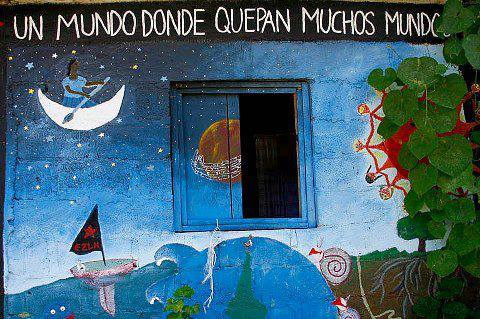How can we truly decolonize ourselves? If there is a common post-colonial discourse that focuses on the importance of achieving a political and economical independence from the Global North, when we begin noticing that knowledge and worldviews were, and still are, constantly colonized, things appear to be even more tricky. Even if the economic and politic independence are not simple things to achieve, as we are still trying to do it 500 years later, the idea of having to go beyond that brings us even more questions of how we could do it. In the texts that we read this week, we could see some suggestions. Since this “natural” order of things that we received as an unsolicited inheritance from the colonizers – more akin to spoils of the carnage imposed upon the natives – is not natural at all, mining them seems like a constant work that we should do. And, once again, it is important to notice that this carnage is not just a physical one, but also of different epistemologies, this carnage is also a “epistemicide” (Santos, 2014).
If we truly want to build “un mundo donde quepan muchos mundos”, as proclaimed by the Zapatistas, we need to understand the plurality of worlds and worldviews. This bring us another difficulty: how can we try to defend and emancipate ourselselves and others marginalized groups without resorting to the Western epistemology? If we usually use their own tools, like the idea of “humanity” and “humanism” as ways of defending the most venerable bodies from violence and death, there is a way of going beyond this grammar itself? Even if these are important discoursive tools which we must use, especially in a context where this bodies are constantly in danger, one must think of how we can also try to use others cosmovision to the same effect. After all, as stated by Cusicanqui (2012, p.100), “there can be no discourse of decolonization, no theory of decolonization, without a decolonizing practice”.
That is why I believe that hers and Juan López Intzín’s usage of indigenous concepts and epistemologies is a powerful tool of trying to go beyond the Western epistemology. The concepts of Ch’ixinakax utxiwa and ASp’ijilal O’tan, respectively, are not used as mere accessories, but as philosophical concepts on their own rights. They are used as ways of trying to see the world in different frames, and I believe that this gesture shows how this different epistemologies/cosmovision can help us to understand the worlds in a broader sense, away from the “la pensée unique” (Mignolo, 2007, p.455). Mignolo’s idea of a necessity of us engaging in “border epistemology and in alternatives TO modernity” seems to resonate with the idea of the usage of this other epistemologies as a way of seeing that this other epistemologies can bring. Now that the borders are not only the imaginary lines that divide countries, but that are constantly being originated from inside the States themselves. “This time, the colonial returns not just in the former colonial territories but also in the metropolitan societies. She is now intruding or trespassing on the metropolitan spaces that were demarcated from the beginning of Western modernity as this side of the line” (Santos, 2014, p.126). Can we see this multiplication of borders, and the intruding of the metropolitan space by the colonial, beyond the segregation brought by them? Inspired by the idea of border epistemology, we can reframe this multiplication of borders and see it as a chance of connecting with diverse and plural worldviews, how to use these others epistemological tools to see beyond the hegemonic Western one. If, as noticed, our situation is trickier than ever, so maybe this demand us to be more trickster than ever. We need to disobey and to turn Western rules and behaviors upside down. “Contra astúcia, astúcia e meia. Contra verdade, verdade e meia”, as stated by Silviano Santiago (2008, p.195). And we know how astute and cunning we can be.
Santiago, Silviano. O cosmopolitismo do pobre. Belo Horizonte: Editora UFMG, 2014. Print.López Intzín, Juan. "Sp'ijilal O'tan: Epistemologies of the Heart." 1 Jan 1970: Print.Mignolo, Walter D.. "Delinking: The rhetoric of modernity, the logic of coloniality and the grammar of de-coloniality." Cultural Studies 21. no. 2: 2007. Accessed 10 Oct 2018. Rivera Cusicanqui, Silvia. "Ch’ixinakax utxiwa: A Reflection on the Practices and Discourses of Decolonization." South Atlantic Quarterly 111. no. 1: 2012. Accessed 12 Oct 2018. de Sousa Santos, Boaventura. Epistemologies of the South: Justice against Epistemicide. Abingdon & New York: Routledge, 2014.